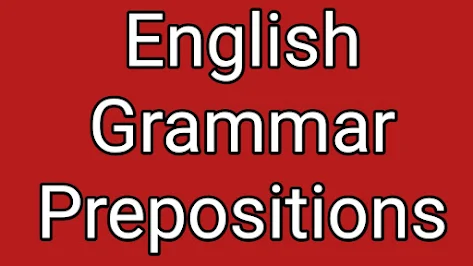English Grammar Preposition Exercise | English Grammar Preposition
The different kinds of words are called parts of speech. The parts of speech are eight in number:
1. Noun
2. verb
3. pronoun
4. Adjective
5. Adverb
6. preposition
7. Conjunction
8. Interjection
 |
| English Grammar Preposition Exercise |
So preposition is a kind of part of speech. Preposition is the jewellery of English Grammar.
Preposition placed before Noun and pronoun
The Noun or pronoun that is placed after the preposition is called it's object.
Preposition- A preposition is a word placed before a noun or pronoun to show what one person or thing has to do with another person or thing.
English Grammar Preposition Exercise
To
From
In
Into
Under
Above
Towards
Between
Beside
Below
Behind
On behalf of
By
About
On
Of
At about/ at around
About to/around to
Before
After
With
For
During
Round
At
Against
Uses of preposition with many example-
1.The dog arrived here before me.
Here the word " Before " Preceding the pronoun 'me' shows what the dog's arrival has to do with ' me'. It shows that the dog arrived sooner than I did . " Before " is therefore a preposition.
2. The man is in a bad temper to- day.
Here the word in placed before the noun 'temper' Or 'a bad temper today' shows what the man has to do with a bad temper. "In" is therefore a preposition.
Here some examples are given below that how prepositions are added to nouns or pronouns to express various different relations-
English Grammar Preposition
1.PLACE , SITUATION, CIRCUMSTANCE
In - Stand in the water.
He is in a bad temper.
Into- Go into the water.
Water can be changed into steam.
Through-Go through the door.
He passed through many dangers.
On or upon- On this condition I will trust you.
Sit on the box.
Over and above- Air is above the earth.
He spends above his income.
Past or beyond- This is the past endurance.
Beyond the boundary.
At- He is not at home.
He was much at fault.
By- I will abide by my promise
Sit by me.
With- All with one exception failed.
I will go with you.
To- He has gone to England
This is much to your credit.
For- He starts for home.
He worked hard for a prize.
Below or under- Snakes live under ground.
The matter is under inquiry.
Behind - The dog is behind you.
There is a smile behind his frown.
Before- Stand before the door.
Duty before pleasure.
From- He starts from home.
We are now free from danger.
Of- He shot wide of the mark.
He was robbed of his purse.
About - Walk about the streets.
He went about his business.
Within - This is not within my power.
He is within the house.
Without - He stands without (outside) the gate.
Men cannot live without food
Near- His success is near my heart
Come near the spot.
Along- The boats were tied along the shore.
Between- Between the two banks of the river.
He still halts between two opinions. ( this is used for two things)
Among or amid - They quarrelled among themselves.
Let us walk amid the trees.
Across - He sailed across the sea.
Sit across the saddle.
Up, down- The monkey ran up and down the tree.
Around or round- Describe a circle round a given centre.
Besides- He has two sons in India besides one in England.
Against- It is not easy to swim against the stream.
Beside- He sat beside me.
He is beside himself with anger.
English Grammar Preposition Exercise
2. TIME
To- The train is not up to time.
To - day, To -night, To - morrow.
For- He was made a Prisoner for life.
During- I will remain here during your pleasure.
Pending- Nothing more can be Pending his arrival.
Till or until - They worked all day till sunset.
Within- This was finished within the time fixed.
Between- He arrived between four and five o' clock P. M.
About- It is now about three o' clock P. M
From - They commence work daily from ten o' clock.
Into- He slept late into the day.
In- He finished the work in ten days.
He arrived in time.
Through- He has been a lazy man through or throughout his whole life.
On - I will expect you on Monday next .
At- Bats fly out at night; but retire at day break.
Behind- He arrived behind time.
After- He returned after many days.
Under- You will not finish that work under two months.
Above or Over- He was absent above or over two weeks.
With- With the return of the hot winds the grass fades.
By - The sun shines by day.
The moon by night.
Past or beyond- He is now past or beyond the age of forty.
More Poem Question :
- Introduction By Kamala Das Click here for PREVIOUS PART
- Critical Analysis Rape of the Lock Line By Line
- Line 40 To 60 only Analysis here, Click here for PREVIOUS PART
- Critical Analysis Rape of the Lock Line By Line
- One Day I wrote Her Name Poem Critical Analysis
- More about Voice change
No comments:
Post a Comment